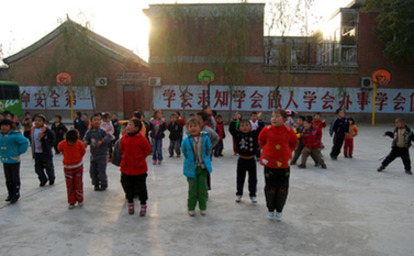The second exhibition hall tells the story of the women who form the majority of assembly line workers in the textile and toy factories that form the backbone of China's export industry. In the pictures they smile, as if to tell people that if they work hard in the city, they can do well and get ahead.
But the reality of life for women workers is cruel. They face a double burden of factory work and family duties, and have fewer employment opportunities than men. Many of them work for a few years in factories before returning home to get married.
One of the most heart-rending items in the museum is a letter written by a young women worker at a toy factory in Shenzhen. Just four months after she told her family how much she missed them, she died in a workplace fire.
As Sun walked us through the exhibitions, he built a quiet but powerful narrative that with their tireless work and self-sacrifice, it is the labor of migrant workers that has been the engine of China's economic miracle.
The museum also has a small community cinema. "It is free. It's packed with local people every weekend – going to watch a film is a big night out round here."
One of the main problems facing migrant workers today is that under the hukou system, public services are usually only available in a person's official place of residence. So, for example, the children of migrant workers are not eligible for free, state education in cities where they have resettled. The paradox is that people from the poorest sections of urban society have to pay school fees to have their children educated.
This inspired another project close to Sun Heng's heart, Tongxin Experimental School, which caters for the children of migrant workers in Picun. Set up in 2005, Tongxin charges relatively affordable fees of 400 yuan (US$58) per semester. Teachers here work for love, not money; their average salary is only 800 yuan (US$117) per month. The classrooms and equipment are basic. But the lively and enthusiastic kids give the place an infectious energy that is absent in some better-equipped downtown schools.
|

|
|
Children of Tongxin Experimental School in Pi Cun, a village near Beijing's Capital Airport, doing after school exercises in the schoolyard. The school was set up in 2005 to cater for the children of the approximately 10,000 migrant workers who live in the area.[John Sexton/China.org.cn]
|
Ms Shen, Tongxin's head teacher said "Basically the school just about breaks even. We rely on around 20 volunteer teachers and some young graduates fresh out of college. Most of them don't stay long because the pay is very low. I stay because I can't bear to leave the kids."
Sun Heng acknowledges he has received some help from the government in his projects, but he wants more. "Our museum got some help. For example, the paving flags in the yard were donated by the government," said Sun. "But we need more help."
(China.org.cn November 7, 2008)